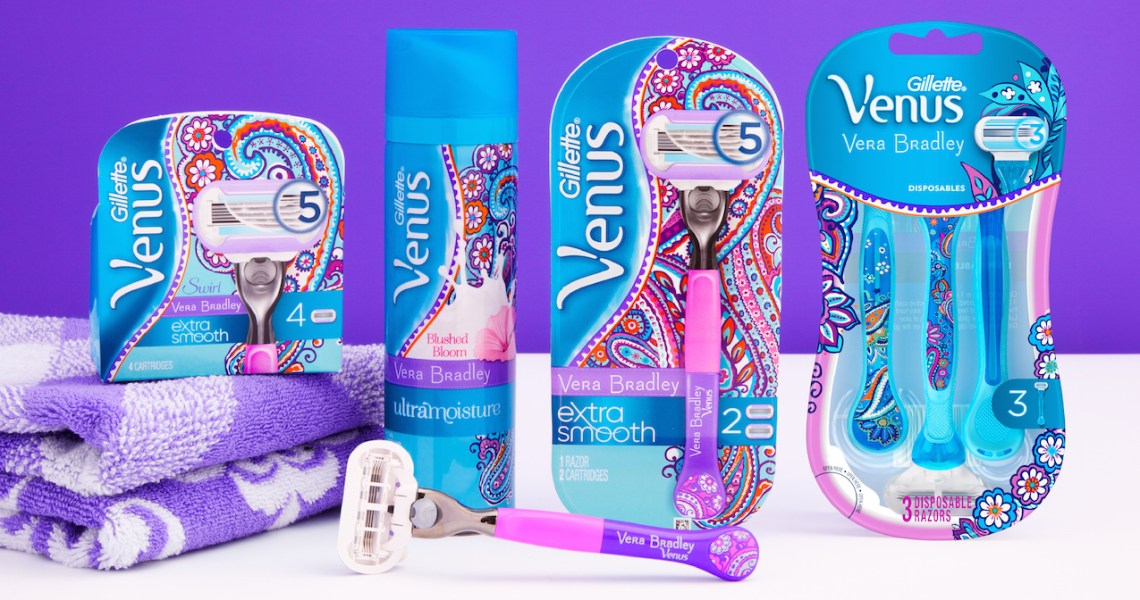Gillette Venus, the Procter & Gamble women’s shaving brand, is hoping a new design collaboration will help to draw customers amid a declining shaving market and competition from upstarts.
Debuting exclusively with Target.com on April 1, followed by expansion to all 1,800 Target locations on April 21, the special edition razors feature a Vera Bradley paisley print on four products, including a shave gel and both disposable and reusable razors. The Vera Bradley collaboration, which is the first fashion collaboration for the 18-year-old Venus brand, is one aspect of many initiatives the brand is undertaking to update itself in response to the emergence of DTC shaving brands like Flamingo (which also launched at Target, in February), Billie, Angel Shave Club, Sphynx and Oui.
“This [collaboration] is a very different approach for us because it’s about where form meets function; this is about bringing fun and beauty to the shaving experience,” said Kara Buckley, P&G head of global grooming communications. “Design is becoming increasingly important. Everyone is more attuned to aesthetics, and this is part of that.”
Beyond the collaboration, Venus has been busy tackling a variety of new projects: In September 2018, it partnered with 10 female directors for Instagram TV ads, and the next month, it launched an ongoing marketing campaign called My Skin, My Way that features more diverse women and is Photoshop-free. In November 2018, it launched a direct-to-consumer subscription service called Venus Direct, and in December, it released one limited-edition razor in collaboration with lifestyle influencer Remi Cruz (@missremiashten, with 1.1 million Instagram followers).
Updating communications, branding and business strategy is necessary for the brand, said Olivia Guinaugh, home and personal-care analyst for market research group Mintel. “Female empowerment movements have been addressing stigmas surrounding body hair, leading to a generational shift in the expectations of shaving and hair removal,” she said.
Young women, between 18 and 34 years old, in particular, are feeling less pressure to remove their body hair and feel it is more acceptable for women to have visible underarm hair, compared to those older than 35 years old, according to September 2018 Mintel report. Additionally, women are more likely to use shaving products only when they need to, as opposed to using them on a regular or daily basis. The women’s shaving and hair-removal products market reached $3.5 billion total retail sales in 2018, declining by almost 4% from 2017, according to Mintel data.
Not only is the marketplace pie getting smaller, but Gillette has seen a sustained decline due to new brand competition. Gillette held 70% of the U.S. razor market share in 2010, but that dropped to 54% as of 2017. (Angel Shave Club launched in March 2016, Billie in November 2017 and Flamingo in October 2018.)
While Buckley stated that Venus has no particular target customer for the Vera Bradley collaboration, it is notable that it has chosen to partner with the 37-year-old fashion brand as opposed to a buzzy younger one. Jon Moeller, COO and CFO of P&G, stated in the company’s latest earnings call in February that the company was moving away from generic demographic targets, like women ages 18 to 49, to “more than 350 precise smart audiences,” such as first-time moms or millennial young professionals. Vera Bradley has particularly found success with Gen Z and Baby Boomers but has also been trying to target millennials, according to a September 2016 story from Washington Post.
“If we can speak to the consumer and make that connection to her, and make her excited about this [collaboration], they will be excited about Venus, as well,” said Buckley.
Sign up for our new Glossy Beauty and Wellness Briefing, a weekly newsletter coming in April that will provide deep-dive analyses, emerging trends and insider insights in the growing beauty and wellness industries.




